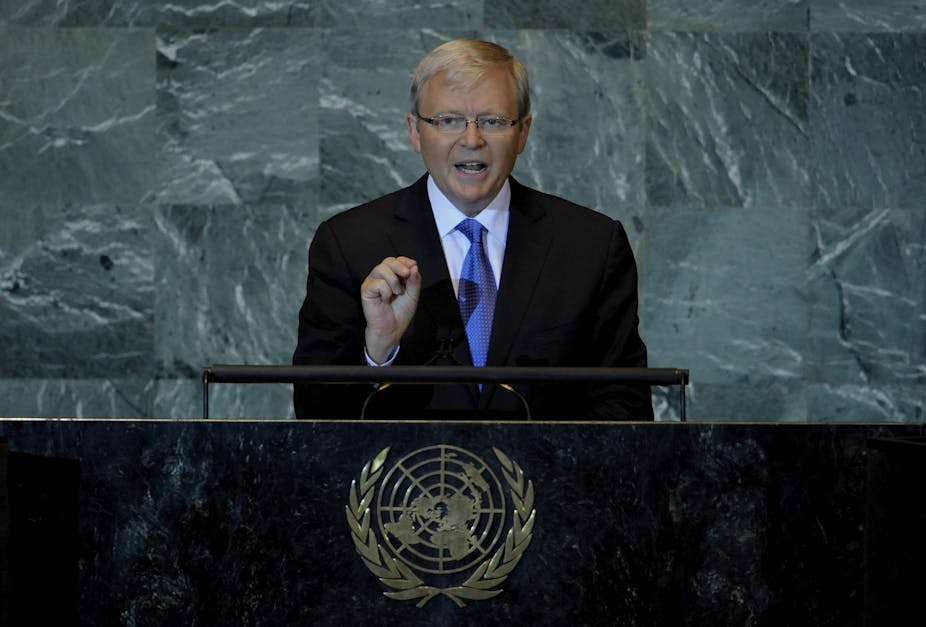Australia is now President of the United Nations Security Council. Throughout September, Australia will set the council’s agenda and chair its meetings. But what will this Saturday’s federal election result mean for Australia’s September presidency and our remaining 16 months on the council?
Under normal circumstances it would be a stroke of good fortune to hold the Security Council presidency in September. Towards the end of the month, presidents and prime ministers from around the world will gather in New York for UN leaders’ week.
In previous years, countries holding the council presidency in September have scheduled high-profile, high-level council debates on important global themes. But the scheduling of federal elections during the same month as our presidency has complicated our diplomatic efforts to make the most of this rare opportunity.
It is no small irony that the greatest challenge posed so far to Australia’s presidential aspirations has come not from a sceptical Coalition, but from a convinced Labor. As Oscar Wilde might have observed, to schedule elections in September once (under Gillard) may be regarded as a misfortune but to do so twice (under Rudd) seems like carelessness.
Kevin Rudd must have been tempted to delay the elections beyond September so that he could have the Security Council presidency all to himself. But the Coalition would have gleefully painted him once again as “Kevin 747”, a prime minister who was more interested in rubbing shoulders with global leaders than humble Australians.
Somehow, despite the conflict between national elections and our Security Council presidency, Australia has managed to schedule a high-level council meeting on small arms. This is the first time since 2008 that the council has held a formal debate on this topic.
According to diplomatic convention, our prime minister will be expected to sit in the president’s chair for the high-level meeting on small arms. This means that the election’s victor will soon get the chance not just to look presidential, but to be president of the most important peace and security body in the world.
So how will the election result affect the rest of Australia’s presidency? The answer is very little. While the Security Council has the flexibility to respond spontaneously to pressing threats to international peace and security, September’s formal schedule was painstakingly negotiated with other council members during August.
No matter which candidate wins government on Saturday, he will have little scope to modify the agenda for this month. In terms of protocol, Australia’s UN Ambassador Gary Quinlan will be the daily face and voice of the council throughout September.
The more interesting question is how the election result will affect Australia’s general participation on the council once our month as president ends. Kevin Rudd’s position on the virtues of Security Council membership would appear clear. He was the chief engineer of Australia’s campaign to join the council and plainly values any chance to showcase his nation’s contributions on the global stage.
So, if anyone understands the importance and the possibilities of our council membership it is Kevin Rudd. If he does win on Saturday, then he could be expected to use the presidency and the remainder of our membership to promote effective action to protect civilians in Syria and to stamp out illegal trade in small arms. However, with the polls the way they are, it is highly likely that Tony Abbott will soon set the priorities for Australia’s membership on the Security Council.

It is less clear how Abbott would use Australia’s seat on the Security Council. He was of course a vocal critic of Australia’s campaign for a council seat and the Coalition’s few electoral foreign policy pronouncements have suggested a preference for Jakarta over Geneva, and trade over aid. Abbott’s shadow foreign minister Julie Bishop recently suggested that a Coalition government would use its membership to focus the council’s attention on preventing the emergence of failed states in our region.
However, if in government, the Coalition would have to engage effectively in council deliberations on the global crises of the moment, no matter where they may be located. In the current climate this is more likely to mean Syria, Egypt or Afghanistan than Fiji or the Solomon Islands. The Coalition should not shy away from shouldering Australia’s responsibilities on the council.
If it serves no other purpose, Australia’s council membership would surely enable Abbott to fulfil the pledge in his policy booklet to “enhance Australia’s role and engagement in the world developing greater international cooperation”.
If Kevin Rudd defies the odds to win Saturday’s election, he would fly to New York in a heartbeat to preside over the Security Council’s high-level meeting on small arms. And despite the Coalition’s vocal opposition to the Labor Party’s campaign for Security Council membership, Tony Abbott’s advisers must be licking their lips at the prospect of prime minister Abbott chairing a council meeting potentially attended by presidents Obama, Putin, Jinping and Hollande, as well as British prime minister David Cameron.
Such a priceless photo opportunity would announce and anoint Abbott as a heavyweight leader on the global stage. Depending on your perspective, it would be a terrible – or delicious – irony that the person he would most have to thank for the chance to partake in his first truly historic moment on the international stage would be none other than Kevin Rudd.

